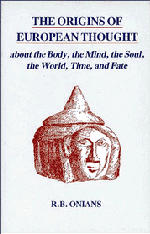Preface to the first edition
Published online by Cambridge University Press: 06 August 2010
Summary
What is the nature of the mind? What are its processes? What is the soul? What is the nature of life? What happens at death and after? What is the significance of the body and of its various parts in men, in animals, in plants? What is the form of the world and how did it originate? By what forces and what means are human destinies determined? What are universals? What is time? This book began in an attempt to discover the earliest answers of the Greeks and of the Romans to these fundamental questions, the beliefs which for centuries satisfied their minds and governed their actions. These beliefs appear to have been embodied in and to explain also a multitude of words and passages in literature, of theories in later philosophy and science, and of legends, myths, and customs. To the faithful eye and the sympathetic imagination there emerges a strange vision, a remarkable system of beliefs, coherent in itself and, when we grasp the appearances of things strangely conspiring, not unreasonable. τέχνη τύχην ἔστερξε καὶ τύχη τέχνην. This vision seems to have been largely shared by other peoples, including Semites and, among ‘Indo-Europeans’, our own Anglo-Saxon, Norse and Celtic ancestors. For, while I have looked first and hardest at the relevant phenomena of experience and at the Greek and Roman evidence, I have adduced evidence also from other languages and literatures and have occasionally made bold with suggestions concerning its meaning, though I am not unaware of the perils of interpreting evidence with imperfect knowledge of its background.
- Type
- Chapter
- Information
- The Origins of European ThoughtAbout the Body, the Mind, the Soul, the World, Time and Fate, pp. xi - xviiPublisher: Cambridge University PressPrint publication year: 1988



